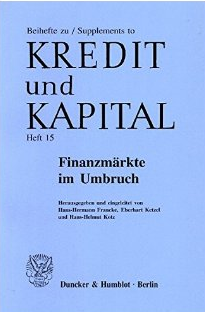
The Financial Crisis from a Forecaster's Perspective
This paper analyses the recession in 2008/2009 in Germany. This recession is very different from previous recessions in particular regarding their causes and magnitude. We show to what extent forecasters and forecasts based on leading indicators fail to detect the timing and the magnitude of the recession. This study shows that large forecast errors for both expert forecasts and forecasts based on leading indicators resulted during this recession which implies that the recession was very difficult to forecast. However, some leading indicators (survey data, risk spreads, stock prices) have indicated an economic downturn and hence, beat univariate time series models. Although the combination of individual forecasts provides an improvement compared to the benchmark model, the combined forecasts are worse than several individual models. A comparison of expert forecasts withthe best forecasts based on leading indicators shows only minor deviations. Overall, the range for an improvement of expert forecasts in the crisis compared to indicator forecasts is small.




